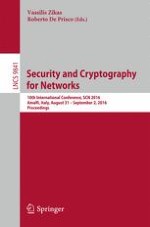2016 | OriginalPaper | Buchkapitel
On Garbling Schemes with and Without Privacy
verfasst von : Carsten Baum
Erschienen in: Security and Cryptography for Networks
Aktivieren Sie unsere intelligente Suche, um passende Fachinhalte oder Patente zu finden.
Wählen Sie Textabschnitte aus um mit Künstlicher Intelligenz passenden Patente zu finden. powered by
Markieren Sie Textabschnitte, um KI-gestützt weitere passende Inhalte zu finden. powered by
